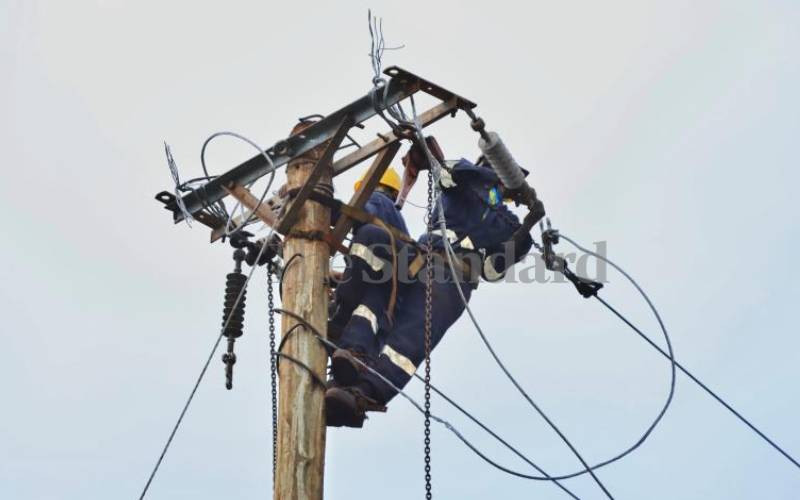The government will next year competitively select power producers that will build electricity generating plants at the Baringo-Silali geothermal fields, wich are then expected to start electricity production by 2028.
This is as Kenya eyes increased electricity production from geothermal to reduce reliance on hydro power that is prone to weather shocks s as well as displace costly thermal power plants.
The Baringo-Silali fields, which are outside the traditional geothermal fields of Olkaria, offer an opportunity to increase geothermal’s installed capacity. The fields have capacity to produce an estimated 3,000 megawatts making them an appealing alternative for the country that now needs to balance between availing power to the grid and making it affordable.
While geothermal resources in Kenya are estimated to have a potential to produce 10,000MW, the country has exploited about 950MW to date. Of this, about 800MW is generated at power plants built by Kengen while the balance is by Independent Power Producers (IPPs) Orpower that produces 150MW at its plants at Olkaria and the recently launched 35MW plant by Sosian Energy at Menengai.
At Baringo-Silali, the Geothermal Development Company (GDC) has drilled wells that can generate up to 70MW and said it will increase this to 100MW by end of this year. It will then invite power companies to build plants that will produce electricity using the geothermal steam from these wells.

- Paka Hills and why Kenya is on the cusp of a geothermal revolution
-
Kenya Power stands accused of allowing daylight robbery

-
The paradox of Kenya's ever-rising power bills

GDC expects the first plant that will have an installed capacity to start feeding the power grid by 2028.
Baringo Silali has quite the potential. One of the wells drilled there set a record of sorts when steam gushing out can produce 22MW of electricity. THis is in comparison to 5MW that ordinary wells produce on average.
“Having one well discharging steam at 22MW is equivalent to drilling about four wells that discharge at 5MW. When you consider that to drill a well costs $5 million (Sh700 million), it is a huge saving. Silali is avery productive area” said Davis Chirchir, Cabinet Secretary Energy and Petroleum.
“We should be going to tender, to invite companies to convert the steam to power by next year,” said the CS, adding the IPPs that would put up power plants at the Baringo-Silali fields would selling electricity to Kenya Power at between six and seven US cents (between Sh8 and Sh10) per unit. This is the cost for the power producers and is before taxes and levies as well as pass through costs such as fuel and forex adjustments are loaded on the power bill
“When the wells are capped, the steam is fuel that is not working for us and yet it is already available. So we will be bringing in the new investments to go to the next frontier of converting the steam to power. Ketraco will also be looking at evacuation so we will be building a transmission network out of these fields.”
GDC has been derisking the fields by way of exploring and drilling wells in areas that show high potential. It did the same in Menengai and parts of Olkaria.
Since it was established about 13 years ago, GDC by bearing the high capital investment for exploring and drilling wells and then inviting other firms to put plants, it has accelerated development of geothermal. Power generation through geothermal stood at around 200MW in 1998 when GDC was formed. At the moment, about of the 950MW geothermal installed capacity is generated using steam from GDC wells.
Pail Ngugi chief executive GDC said the firm plans to develop the Baringo-Silali fields in phases, with the first phase expected to produce 300MW – 100MWe each from the three fields of Paka, Korosi and Silali.
Paka field, where most of the work has been done,is expected to start production of the first 100MW from Paka prospect by 2028.
“We are developing this project in phases and the first phase will produce 100MW. We have already drilled for the steam and what is next is power plant construction,” said Ngugi.
“We are doing a feasibility study and once this is done by early next year, we can now start seeking investors. Once we get the investors, we should have this project in place in the next three years. We are looking at 2027, latest 2028, we should be able to have power feeding the grid.”
“The cost of power from our projects is about seven US cents… if we can duplicate this cost of seven US cents over several other geothermal fields, we can actually bring the cost of power down.”
While the Energy Ministry is preparing to invite companies to place bids for building the power plants, earlier expectations were that Kengen would take over the fields derisked by GDC.
CS Chirchir said the government will take the firms that will sell electricity at the lowest price to the Kenyan consumers.
The Presidential Taskforce on Review of Power Purchase Agreements (PPAs) had in 2021 recommended that GDC should give Kengen the first right of refusal to the fields that it has already derisked.
This is on account of past experiences, where IPPs contracted to put up power plants at the Menengai geothermal fields have taken unnecessarily long to put up the power plants.
Three companies were selected in 2014 to put up power plants at Menengai fields and to date, only one firm has completed constructing its power plant. THe companies were to put up plants with a combined electricity generating capacity of 105MW or 35MW each.
GDC sunk the wells and built the steam gathering systems as a way to derisk the geothermal fields, making it easy for private sector players to gain entry in the country’s geothermal sector and increase power from the renewable resource.
“The taskforce found it inconceivable that Kengen did not qualify for projects tendered by GDC for stream conversion,” said the Taskforce in its report.
Chirchir noted that if Kengen could offer power at low prices, it would be given the go ahead. He however added that a competitive process would help in price discovery and the Kenyan consumer would be the ultimate beneficiary.
“But yes, if Kengen can deliver at four US cents, five US cents, we should do it. If somebody else can deliver at a better cost, why not,” he said but also explained that the company should be cautious not to be saddled with too much debt.
“Kengen is a government entity and investments will be determined by the state of its balance sheet. We do not want them to be overstretched,” he said, adding that Kengen’s room to borrow to finance such a project would be determined by how much borrowing room the government has. In certain instances, the state borrows for onlending to Kengen.
“We also borrow as a government for onlending to Kengen, to get concessional funding. If government’s headroom to borrow is in a good position, we should be able to do that and allow Kengen to take advantage of that low cost of money and get to reduce their cost of power
He also noted that Kenngen is also doing other projects including a solar power plant at the seven forks hydro power project that is expected to be among those that feed the grid at low cost. By Macharia Kamau, The Standard






